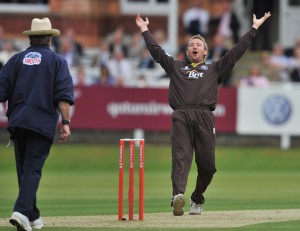
A gradual but inevitable descent into cricket-based loathing and bile.
Whatever Happened to the Unlikely Lads? #9: Chris Schofield
The majority of entrants into this shameful club so far have been those who we’ve rewarded for the sort of sustained awfulness that characterised England’s dark days of the 1990’s. With number eight, however, we widened the eligibility rules slightly and we’re now about to do so again. England’s search for their answer to Shane Warne went on for many a long year – almost from the moment he bowled Mike Gatting at Old Trafford to the day he left the international fold in Sydney. Their search for ‘the new Ian Botham’ went on for even longer, destroying the international careers of any number of young, promising all rounders.
Imagine the wide-eyed excitement amongst the establishment, then, when they thought they’d found someone who could perform both roles. Imagine that establishment having a brand new set of central contracts to dish out and imagine how they wanted to show that this wouldn’t be ‘same old England’. Twelve contracts were awarded as a new dawn broke in English cricket, eleven of which were fairly predictable and unexciting. The ugly duckling of that list is about to feel the full force of the 51allout glare, a man of whom Nasser Hussain memorably wrote in his book that ‘he didn’t seem able to bowl a hoop downhill’. And on that note, let us introduce…
#9: Christopher Paul Schofield
The summer of 2000 saw the true beginning of the Hussain/Fletcher era. They had been pressured into taking an experimental squad on their first tour to South Africa so the two-Test home series with Zimbabwe was the first chance they had to pick their own team. It’s probably best that we don’t dwell on some of the selections in that series as they were working towards their own XI (Mark Ramprakash opening, Nick Knight at six. No. Not dwelling) and focus instead on the one we’re most concerned with. In South Africa England didn’t even pick a spinner for three of the Tests; the man in possession for the two games in which they did was Phil Tufnell. His completely inability to bat or field was never likely to be a comfortable bed-fellow with Fletcher’s demand that everyone in the side, backroom team, press corps and in the stands be able to contribute runs, so there was a position up for grabs.
Enter Schofield, with just two county seasons and an ‘A’ tour behind him. He could, in theory, offer something in all three disciplines and was promptly given a central contract and picked for the first Test at Lord’s. In an impressive display of incompetence, Zimbabwe’s batsmen only managed to last 68 overs in the match and Schofield didn’t bowl a ball. He made a duck batting at eight in England’s solitary innings as the home side romped home by an innings and 209 runs. So far, so bad. He finally got a chance in the second Test at Trent Bridge: batting low down again he made 57 to help the last four wickets put on exactly 100 (a not-unimpressive feat given the three men below him in the order were Gough, Caddick and Giddins). From then on his career began spiralling downwards at an exceptional rate. He was thrown the ball during the Zimbabwean reply, took 0/73 and then made just 10 in the second innings as England tried, unsuccessfully, to lose the game.
That, then, was that. Although it wasn’t, which is what makes the Schofield story an interesting one. His Test career was done and dusted after Nottingham, barring an increasingly unlikely looking recall, and in 2004 he was unceremoniously dumped by Lancashire. Left without a county he ended up playing for Suffolk until late in the 2006 season when he was picked up by Surrey. His is undoubtedly a career of remarkable peaks and troughs; offered a full deal in 2007 he impressed in the one-day arena and suddenly found himself back in the England fold for the T20 World Cup in South Africa that year.
From the Minor Counties to the World Cup in little over a year is quite some turnaround, and perhaps is what captures the imagination. England’s T20 selection policy in the beginning was as scattergun as the 90’s had been; the likes of Darren Maddy, James Kirtley and Jeremy Snape, as well as Schofield, played in that first World Cup. The latter was involved the first four games, taking 2/15 against Zimbabwe in England’s only win of the tournament before his performances went the way of the team’s as a whole. Batting at nine he got few opportunities in that department and figures of 2/77 in 9.5 overs across his other three appearances weren’t enough for him to keep his place. England went in without a spinner for their final game against India, got absolutely slaughtered and exited without so much of a whimper. With them went Schofield’s international career.
Domestically he became a one day specialist with Surrey up until the end of last season, when he was released and again found himself without a county. It would be interesting to know what Schofield himself makes of his own career. His is not like others who have had numerous chances; Hussain’s description of him makes it pretty clear what the feeling around the England squad was at the time, and that seems to have affected what followed. It’s difficult to think of any other player in recent times who has had such a turbulent career. Had he been managed then as young prospects are now, would he have played much more at international level? Some truly terrible players played one day cricket for England in the decade after he made his bow, he would surely have made an impact with a few years’ experience under his belt. Instead he is destined to go down in history as the anomaly of the central contract system, as its one big failing. As well as the man who couldn’t bowl a hoop downhill.




No Comments
Post a Comment